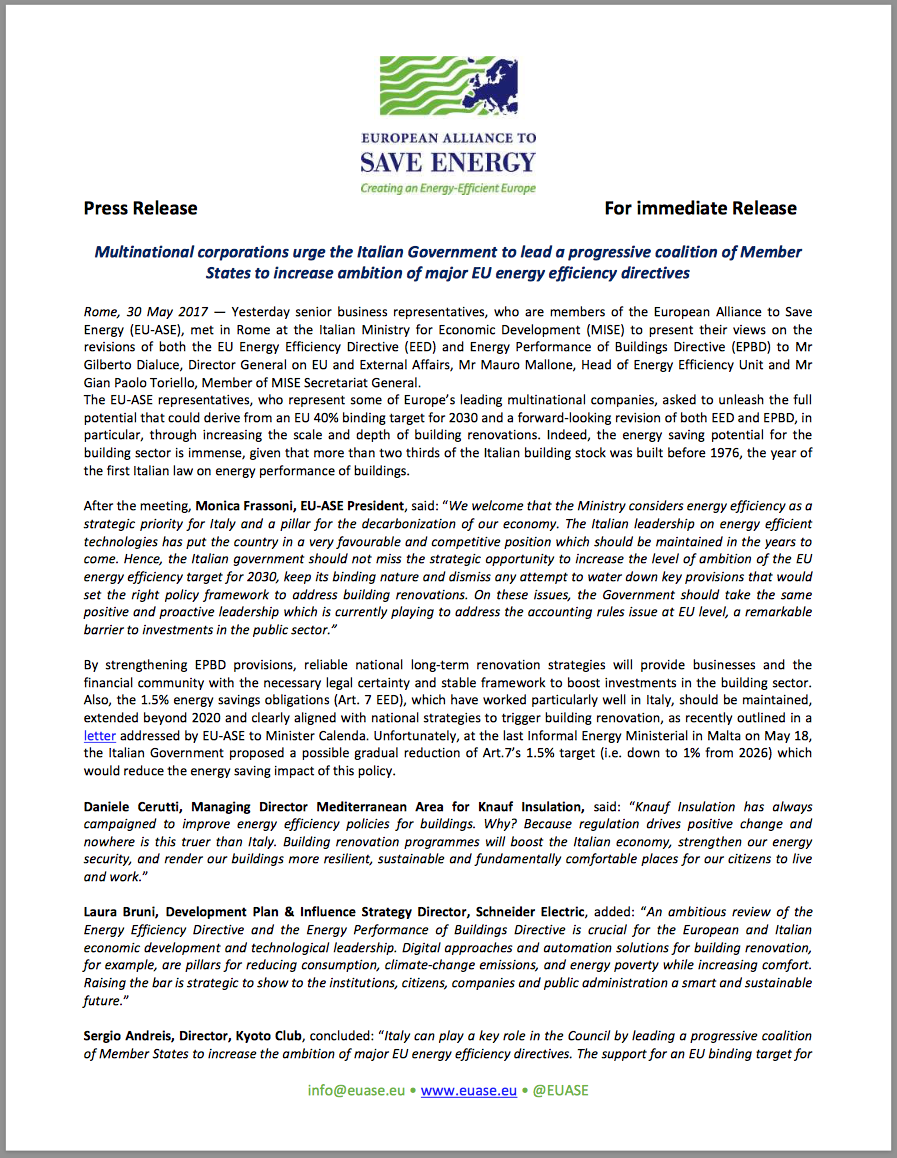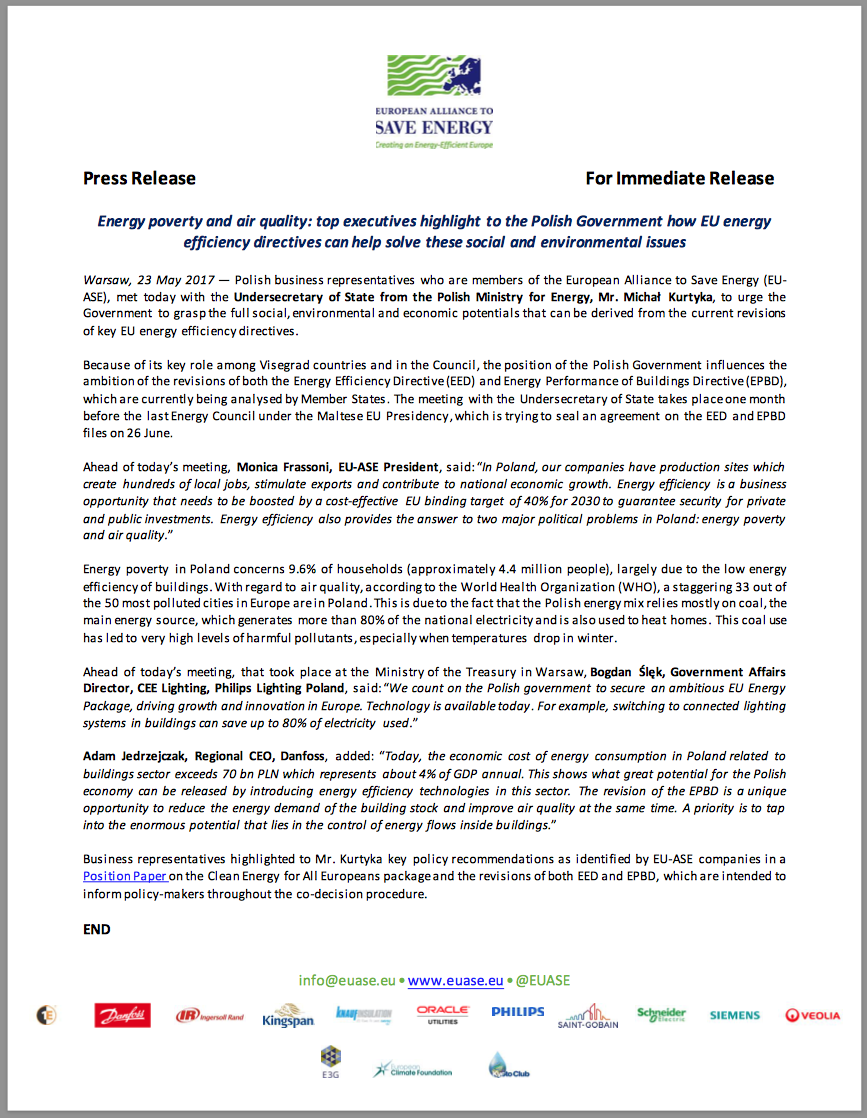Multinational corporations urge the Italian Government to lead a progressive coalition of Member States to increase ambition of major EU energy efficiency directives

Rome, 30 May 2017 — Yesterday senior business representatives, who are members of the European Alliance to Save Energy (EU-ASE), met in Rome at the Italian Ministry for Economic Development (MISE) to present their views on the revisions of both the EU Energy Efficiency Directive (EED) and Energy Performance of Buildings Directive (EPBD) to Mr Gilberto Dialuce, Director General on EU and External Affairs, Mr Mauro Mallone, Head of Energy Efficiency Unit and Mr Gian Paolo Toriello, Member of MISE Secretariat General.
The EU-ASE representatives, who represent some of Europe’s leading multinational companies, asked to unleash the full potential that could derive from an EU 40% binding target for 2030 and a forward-looking revision of both EED and EPBD, in particular, through increasing the scale and depth of building renovations. Indeed, the energy saving potential for the building sector is immense, given that more than two thirds of the Italian building stock was built before 1976, the year of the first Italian law on energy performance of buildings.
After the meeting, Monica Frassoni, EU-ASE President, said: “ We welcome that the Ministry considers energy efficiency as a strategic priority for Italy and a pillar for the decarbonization of our economy. The Italian leadership on energy efficient technologies has put the country in a very favourable and competitive position which should be maintained in the years to come. Hence, the Italian government should not miss the strategic opportunity to increase the level of ambition of the EU energy efficiency target for 2030, keep its binding nature and dismiss any attempt to water down key provisions that would set the right policy framework to address building renovations. On these issues, the Government should take the same positive and proactive leadership which is currently playing to address the accounting rules issue at EU level, a remarkable barrier to investments in the public sector.”
By strengthening EPBD provisions, reliable national long-term renovation strategies will provide businesses and the financial community with the necessary legal certainty and stable framework to boost investments in the building sector. Also, the 1.5% energy savings obligations (Art. 7 EED), which have worked particularly well in Italy, should be maintained, extended beyond 2020 and clearly aligned with national strategies to trigger building renovation, as recently outlined in a letter addressed by EU-ASE to Minister Calenda. Unfortunately, at the last Informal Energy Ministerial in Malta on May 18, the Italian Government proposed a possible gradual reduction of Art.7’s 1.5% target (i.e. down to 1% from 2026) which would reduce the energy saving impact of this policy.
Daniele Cerutti, Managing Director Mediterranean Area for Knauf Insulation, said: “ Knauf Insulation has always campaigned to improve energy efficiency policies for buildings. Why? Because regulation drives positive change and nowhere is this truer than Italy. Building renovation programmes will boost the Italian economy, strengthen our energy security, and render our buildings more resilient, sustainable and fundamentally comfortable places for our citizens to live and work.”
Laura Bruni, Development Plan & Influence Strategy Director, Schneider Electric, added: “ An ambitious review of the Energy Efficiency Directive and the Energy Performance of Buildings Directive is crucial for the European and Italian economic development and technological leadership. Digital approaches and automation solutions for building renovation, for example, are pillars for reducing consumption, climate-change emissions, and energy poverty while increasing comfort. Raising the bar is strategic to show to the institutions, citizens, companies and public administration a smart and sustainable future.”
Sergio Andreis, Director, Kyoto Club, concluded: “ Italy can play a key role in the Council by leading a progressive coalition of Member States to increase the ambition of major EU energy efficiency directives. The support for an EU binding target for energy efficiency at 40%, underpinned by dedicated policies and measures, can bring tangible benefits to industry and citizens through, for example, reduced energy bills, creation of local jobs, better health and comfort and higher productivity.”
At the meeting, the EU-ASE business representatives also expressed their support for a rapid launch of the Energy Efficiency Guarantee Fund, which has been expected since 2015 but not established yet—and which, in their view, would further support energy efficiency investments in Italy.


